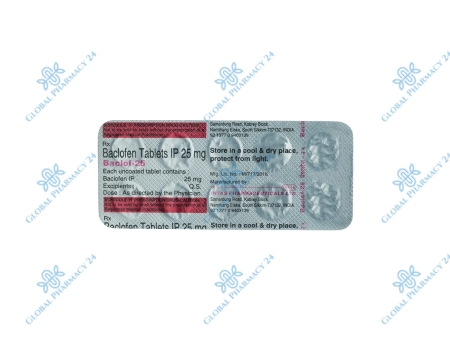| Characteristic | Details |
|---|---|
| Active Ingredient | Baclofen |
| Therapy Type | Intrathecal (ITB) |
| Primary Use | Controlling Spasticity |
| Duration of Effect | Variable; based on dosage and pump settings |
| Administration | Through an implanted pump |
Understanding Baclofen Intrathecal Therapy (ITB)
Baclofen Intrathecal Therapy (ITB) is a specialized treatment designed to manage severe spasticity by delivering medication directly into the spinal fluid, allowing for lower doses with fewer side effects compared to oral administration. This method utilizes a programmable pump implanted under the skin to continuously deliver baclofen, offering precise control over spasticity symptoms in patients with conditions such as multiple sclerosis, spinal cord injury, and cerebral palsy.
ITB therapy is particularly beneficial for patients who have not responded well to oral medications or have experienced intolerable side effects. The direct delivery system of ITB allows for a significant reduction in spasticity, improving mobility, ease of care, and overall quality of life for affected individuals. Regular monitoring and adjustments by healthcare professionals are critical to optimizing therapy outcomes.
What is Baclofen?
Baclofen is a muscle relaxant and antispastic agent that works by inhibiting the transmission of nerve signals in the central nervous system, effectively reducing spasticity. Its use in Intrathecal Baclofen Therapy offers targeted relief with minimized systemic exposure, making it a cornerstone treatment for managing severe spasticity.
The Role of ITB in Controlling Spasticity
ITB plays a pivotal role in the management of spasticity by delivering baclofen directly to the site of action in the spinal cord. This targeted approach allows for effective spasticity control with lower doses of medication, resulting in fewer side effects and enhanced patient comfort and mobility.
The Procedure of ITB: A Step-by-step Guide
The ITB procedure involves the surgical implantation of a pump and catheter, with the pump placed under the skin of the abdomen and the catheter extending to the spinal canal. Post-implantation, the pump is programmed to deliver baclofen at a prescribed rate, requiring regular check-ups to ensure optimal functionality and medication dosage.
The Significance of Regular Check-ups for Pump Maintenance
Regular check-ups are essential for maintaining the pump's performance and ensuring the continued effectiveness of ITB therapy. During these visits, healthcare providers can adjust the dosage, check the battery, and address any potential issues, ensuring the long-term success of the treatment.
The National Center for Child Health and Development's Approach to ITB
The National Center for Child Health and Development adopts a comprehensive and patient-centered approach to ITB, emphasizing individualized treatment plans, rigorous follow-up care, and the integration of multidisciplinary expertise. This approach ensures optimal outcomes and enhances the quality of life for pediatric patients suffering from severe spasticity.
Through its dedicated programs, the Center offers a robust framework for ITB therapy, incorporating the latest research findings and clinical practices to advance the treatment of spasticity. The commitment to excellence and innovation positions the Center as a leader in the field of pediatric spasticity management.
ITB Practice Guidelines at the Center
The Center follows strict practice guidelines for ITB, which include comprehensive pre-implantation evaluation, meticulous surgical technique, and a structured post-operative care plan. These guidelines ensure the safety and effectiveness of ITB therapy for each patient.
Successful Case Studies and Track Record
The Center boasts a strong track record of successful ITB interventions, evidenced by numerous case studies highlighting significant improvements in spasticity control, patient mobility, and overall quality of life. These successes underscore the Center's expertise and commitment to excellence in ITB therapy.
How to Get Started with ITB at the National Center
Initiating ITB therapy at the National Center involves a detailed assessment process to determine eligibility, followed by a thorough discussion of the potential benefits and risks. This ensures that candidates and their families are well-informed and prepared for the journey ahead.
The Center's multidisciplinary team provides comprehensive support throughout the process, from the initial consultation to post-implantation care, ensuring a smooth transition and optimal therapy management for each patient.
Understanding the Appointment Process
The appointment process for ITB at the National Center begins with a referral from a primary care physician or specialist, followed by an initial evaluation by the Center's team to assess the patient's suitability for ITB therapy. This collaborative approach ensures that all patients receive personalized care tailored to their specific needs.
Assessing the Effectiveness and Risks of ITB
ITB therapy has been proven to effectively reduce spasticity and improve quality of life for many patients. However, like all medical treatments, it carries certain risks and requires careful consideration and management by a dedicated healthcare team.
Evaluating the effectiveness and risks of ITB involves ongoing assessment and monitoring to ensure that the benefits outweigh the potential complications. This balanced approach is crucial for achieving the best possible outcomes for patients undergoing ITB therapy.
How to Mitigate ITB Risks
To mitigate the risks associated with ITB, patients are advised to adhere to scheduled check-ups and pump maintenance, promptly report any symptoms or concerns, and closely follow the guidance of their healthcare team. These measures are critical for ensuring the safety and effectiveness of ITB therapy.
Financial Considerations
The cost of ITB therapy can be significant, encompassing the price of the pump, surgery, medication, and ongoing care. However, many patients find the investment worthwhile for the substantial improvements in quality of life and reduction in spasticity symptoms.
It's important for patients and families to explore all financial options, including insurance coverage, assistance programs, and grants, to help manage the costs associated with ITB therapy.
The Costs of Baclofen ITB
The overall cost of Baclofen ITB therapy includes the initial surgical implantation of the pump, the drug itself, and continuous follow-up care. While expensive, insurance plans often cover ITB therapy for eligible patients, significantly reducing out-of-pocket expenses.
Coverage and Insurance Aspects
Insurance coverage for ITB therapy varies by provider and plan. Patients should consult with their insurance company and healthcare provider to understand coverage details, including any pre-authorization requirements, copayments, and deductibles. Assistance programs may also be available to help offset costs.
Further Research and Developments in ITB
Research into ITB therapy is ongoing, with studies focusing on optimizing dosing strategies, expanding indications, and improving pump technology. These developments promise to enhance the safety, efficacy, and accessibility of ITB for patients with severe spasticity.
The future of ITB therapy is bright, with potential innovations including programmable pumps with enhanced functionality, novel drug formulations, and minimally invasive surgical techniques. These advancements aim to further improve patient outcomes and quality of life.
Emerging Trends and Innovations in ITB
Emerging trends in ITB research include the exploration of combination therapies, advanced pump technologies, and personalized medicine approaches. These innovations have the potential to revolutionize the management of spasticity, offering new hope to patients with challenging conditions.
FAQs Baclofen
What is Baclofen used for?
Baclofen is a medication primarily used to treat muscle spasms caused by certain conditions such as multiple sclerosis, spinal cord injuries, or diseases affecting the spinal cord.
How does Baclofen work?
Baclofen works by acting on the nerves in the spinal cord to decrease the number and severity of muscle spasms and to relieve pain, allowing muscles to relax.
What are the common side effects of Baclofen?
Common side effects of Baclofen may include drowsiness, dizziness, weakness, fatigue, nausea, headache, and confusion. It's important to consult with a healthcare professional if any side effects persist or worsen.
Can Baclofen be addictive?
Baclofen has the potential for abuse and dependence, especially if used improperly or in high doses. It's essential to use Baclofen only as prescribed by a healthcare provider and to follow their instructions carefully to minimize the risk of addiction.

























